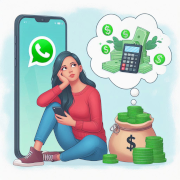WhatsApp: Jan Koum um Schadensbegrenzung bemüht
18. März 2014, 21:36
|  2 KommentareIn einem aktuellen Blogeintrag versucht WhatsApp Gründer und CEO Jan Koum die Bedenken der User und Medien zu zerstreuen. In seinem leidenschaftlichen und mit Pathos geprägten Eintrag erklärt er, dass sich auch durch die Übernahme durch Facebook nichts für die User ändern wird.
2 KommentareIn einem aktuellen Blogeintrag versucht WhatsApp Gründer und CEO Jan Koum die Bedenken der User und Medien zu zerstreuen. In seinem leidenschaftlichen und mit Pathos geprägten Eintrag erklärt er, dass sich auch durch die Übernahme durch Facebook nichts für die User ändern wird.

Gerüchte und Behauptungen, dass sich bei WhatsApp durch die Übernahme etwas ändern könnte, stellt Jan Koum als unrichtig dar und erklärt diese Behauptungen als "jeder Grundlage entbehrend" dar. WhatsApp wollte und will so wenig wie möglich über seine User ändern:
Zitat:"Respekt gegenüber eurer Privatsphäre ist in unserer DNA eingebrannt".
Außerdem erklärt er, dass der Deal mit Facebook nicht zustande gekommen wäre, hätte es eine Veränderung beziehungsweise Verschiebung der Wertevorstellung bedeutet. Der Deal sieht zudem auch vor, dass WhatsApp weiterhin autonom arbeitet und nicht von Facebook neue Bestimmungen vorgelegt bekommen kann.
Zitat:Since announcing our upcoming partnership with Facebook, weĆ‚ā€™ve been truly humbled by how much attention our story has received. As a company, weĆ‚ā€™re excited to continue focusing on offering as many people as possible the chance to stay connected with friends and loved ones, no matter who they are or where they live.
Unfortunately, there has also been a lot of inaccurate and careless information circulating about what our future partnership would mean for WhatsApp usersĆ‚ā€™ data and privacy.
IĆ‚ā€™d like to set the record straight.
Above all else, I want to make sure you understand how deeply I value the principle of private communication. For me, this is very personal. I was born in Ukraine, and grew up in the USSR during the 1980s. One of my strongest memories from that time is a phrase IĆ‚ā€™d frequently hear when my mother was talking on the phone: "This is not a phone conversation; IĆ‚ā€™ll tell you in person.Ć‚ā€¯ The fact that we couldnĆ‚ā€™t speak freely without the fear that our communications would be monitored by KGB is in part why we moved to the United States when I was a teenager.
Respect for your privacy is coded into our DNA, and we built WhatsApp around the goal of knowing as little about you as possible: You donĆ‚ā€™t have to give us your name and we donĆ‚ā€™t ask for your email address. We donĆ‚ā€™t know your birthday. We donĆ‚ā€™t know your home address. We donĆ‚ā€™t know where you work. We donĆ‚ā€™t know your likes, what you search for on the internet or collect your GPS location. None of that data has ever been collected and stored by WhatsApp, and we really have no plans to change that.
If partnering with Facebook meant that we had to change our values, we wouldnĆ‚ā€™t have done it. Instead, we are forming a partnership that would allow us to continue operating independently and autonomously. Our fundamental values and beliefs will not change. Our principles will not change. Everything that has made WhatsApp the leader in personal messaging will still be in place. Speculation to the contrary isnĆ‚ā€™t just baseless and unfounded, itĆ‚ā€™s irresponsible. It has the effect of scaring people into thinking weĆ‚ā€™re suddenly collecting all kinds of new data. ThatĆ‚ā€™s just not true, and itĆ‚ā€™s important to us that you know that.
Make no mistake: our future partnership with Facebook will not compromise the vision that brought us to this point. Our focus remains on delivering the promise of WhatsApp far and wide, so that people around the world have the freedom to speak their mind without fear.
Zumindest für die nächsten vier Jahre bedeutet es keine Veränderung, denn erst dann geht WhatsApp zur Gänze in den Besitz von Facebook über. Erst dann sollte man sich auch tatsächlich Gedanken um die weitere Verwendung von WhatsApp Gedanken machen.
via via 




